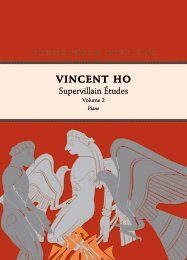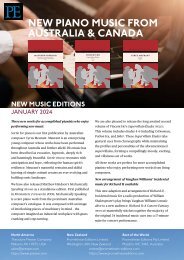Firestarters 2
Music by Penny Axtens, Stuart Greenbaum, Ross Harris, Matthew Hindson, James Ledger, John Psathas and Anthony Ritchie | Piano
Music by Penny Axtens, Stuart Greenbaum, Ross Harris, Matthew Hindson, James Ledger, John Psathas and Anthony Ritchie | Piano
Create successful ePaper yourself
Turn your PDF publications into a flip-book with our unique Google optimized e-Paper software.
FIRESTARTERS 2<br />
7 New Recital Pieces for Piano<br />
Torrent (2001)<br />
Penelope Axtens (1975)<br />
Penelope Axtens began studies in composition and piano<br />
performance at the University of Auckland, New Zealand, and<br />
completed a Masters degree at Victoria University of Wellington<br />
under the tutelage of Ross Harris and John Psathas. Her work<br />
For Violin, Violoncello and Piano, composed while she was still a<br />
student, has been widely performed in New Zealand and overseas<br />
and was selected as the representative New Zealand chamber<br />
work for the 2004 IAMIC Annual List. Axtens won the New<br />
Zealand Symphony Orchestra-Concert FM ‘Music 2000’ Prize with<br />
her orchestral work Part the Second, which was subsequently<br />
performed and broadcast throughout New Zealand. The prize<br />
also included a commission from the NZSO for a 20-minute<br />
orchestral work, and this resulted in From the Sixth Hour which<br />
was premiered by the NZSO in 2002. In the same year Axtens<br />
was the recipient of the Composers’ Association of New Zealand<br />
(CANZ) Trust Fund Award, made annually to ‘a composer of<br />
outstanding potential or achievement’. Currently, she lives in<br />
London.<br />
In order to better understand Torrent, the performer should read<br />
and visualise the lines written by the composer.<br />
The music, a depiction of different energy levels within nature<br />
that has at its heart the juxtaposition of stillness and cascading<br />
motion, must maintain a sense of linearity throughout. This<br />
applies particularly within the chord sequences: aim to employ<br />
slow, fluid arm movements and finger pedalling where possible.<br />
There are a number of notational conventions employed that are<br />
specific to this piece. The music is unmetered, and dotted barlines<br />
are provided in places merely as a visual aid to assist vertical<br />
coordination rather than to imply points of stress. Accidentals<br />
apply only to those notes they immediately precede. In general,<br />
groups of beamed quavers should be played with a sense of<br />
‘localised acceleration’ within the prevailing tempo. Tenuto marks<br />
imply a slight prolongation of a note.<br />
On page 6, in the third and fourth systems, pedalling should be<br />
used to maintain clarity of the upper line. Note also the use of<br />
half-pedalling, beginning in the fifth system of this page.<br />
The composer writes:<br />
Trembles green in the morning rains<br />
It is the ridge we climb<br />
Over lifetimes of stillness<br />
Down to Torrent Bay<br />
(for Ros)<br />
Ritual from Poems of Spring (1981)<br />
Anthony Ritchie (1960)<br />
Anthony Ritchie was born and educated in Christchurch, New<br />
Zealand, the son of composer John Ritchie. He received his first<br />
commission in 1982, his final year at Canterbury University. This<br />
resulted in his Concertino for Piano and Strings. He travelled<br />
to Hungary in 1983 to study the music of Bartók for a doctoral<br />
thesis, and also studied composition there under Attila Bozay<br />
at the Liszt Academy. Ritchie has been based in Dunedin,<br />
New Zealand since 1988, where he has worked as a freelance<br />
composer, writing for chamber groups, dance, choir, opera, film<br />
and orchestra. Many of his works have been performed overseas,<br />
and a growing number have been recorded and published.<br />
Ritchie currently lectures in composition at Otago University. He<br />
has composed extensively for the piano, and among his recent<br />
works is a major cycle of 24 Preludes (2002).<br />
This short piece is full of character and vitality. The composer<br />
indicates that it is to be played fast and roughly. However, the<br />
performer should still take note of every dynamic nuance and<br />
remain true to all the articulation markings. This is the key to a<br />
successful performance!<br />
Small noteheads in the right hand indicate chords that may be<br />
omitted if necessary to facilitate performance.<br />
The composer writes:<br />
Ritual is one of the eight short pieces comprising Poems of<br />
Spring (four of the other pieces are published in <strong>Firestarters</strong><br />
1), which were composed while I was a third-year student<br />
at the University of Canterbury, and first performed there<br />
by myself in 1982. They were inspired by two major events<br />
in my life at that time: first, the ructions caused by the 1981<br />
Springbok rugby tour which I found myself caught up in; and<br />
second, a love affair which ended in grief. Ritual owes a debt<br />
to Stravinsky’s Le sacre du printemps, attempting to evoke the<br />
earthy, sexual energy of spring through its vigorous rhythms.<br />
Waiting for the Lights to Change (2001)<br />
James Ledger (1966)<br />
James Ledger is an Australian composer whose orchestral works<br />
have been performed by all of that country’s major orchestras.<br />
He has composed soundtracks for several short films and<br />
documentaries for the ABC, SBS and independent filmmakers.<br />
His orchestral music has been used for seasons with the West<br />
Australian Ballet.<br />
In 2003 and 2004, Ledger was the composer attached to the<br />
Adelaide Symphony Orchestra, and in late 2004 he took up a<br />
residency with the Christchurch Symphony in New Zealand. In<br />
addition to new work for the Christchurch Symphony in 2005,<br />
James has commissions for the Sydney and West Australian<br />
Symphony Orchestras.<br />
PE068 – 42


















